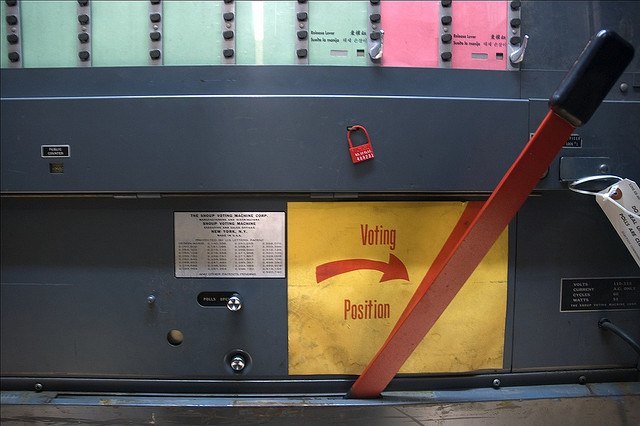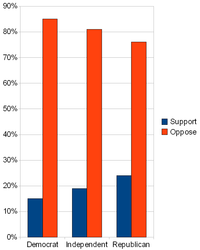
The upcoming November election has already seen its fair share of fundraising. Active members in both political parties have likely received a flood of emails directing individuals to their preferred party’s donation page. These efforts have produced serious results — Republican nominee Mitt Romney has raised a staggering $106 million, beating President Obama’s $71 million. These figures are not comprehensive; they are the fundraising efforts that the candidates pulled for June alone.
So far, Romney’s campaign has publicly stated that it has raised about $389 million, just under Obama’s $512 million. According to public record, although Romney claims that much of his money comes from grassroots fundraising (usually found in individual donations of $250 or less), the majority of the Romney campaign is actually financed through a smaller proportion of the population. Reuters reports,
“The figures released by Romney’s campaign indicated that nearly 80 percent of the total for June came from just 6 percent of the donations it received – meaning that big-money donors are driving most of the campaign’s effort. About $22.3 million, or roughly one-fifth of the Romney campaign’s total for June, came in donations of $250 or less, which generally are seen as a gauge for grassroots support.”

Presumably, this election will generate even more donations to the American Presidential race, since this is the first election with super PAC participation. Super PACs, or ‘super Political Action Committees’ originated in 1943 as the labor unions’ response to not being able to donate directly to political campaigns. Yet, in 1943, labor PACs could only receive donations up to $5000. With such huge amounts of money being handed to candidates to finance the major American political event, there had to be some rules and regulations for campaigns. However, in 2010, the Supreme Court ruled in favor of the proliferation of super PACs as independent organizations in federal elections, protected by the right to free speech.
Modern campaign finance law is regulated under the Federal Election Campaign Act of 1971, which gave rise to the Federal Election Committee. The FEC, an independent organization, states that its mission is “to disclose campaign finance information, to enforce the provisions of the law such as the limits and prohibitions on contributions, and to oversee the public funding of Presidential elections”. These give political candidates strict limitations to the efforts that define how much fundraising they can accept from independent donors.
It was the FEC that tried to pull the negative documentary about Hillary Clinton from American televisions, since the suit was brought up in 2008. Citizen United, a pro-Republican PAC, raised money to produce and broadcast the film on television. The ruling limits the FEC’s jurisdiction over independent campaign fundraising efforts and does not limit the “freedom of speech” of individual participants independent of federal elections.
Citizens United v. FEC (2010) is a landmark case for American elections and politics. In the ruling, the Supreme Court held that super PACs are able to raise unlimited amounts of funds for campaigns, but must operate independently from the campaigns themselves. This is a reversal from the previous law that struck down the amount of corporate influence in the 1904 law, which prohibited corporate donations to funds and was the status quo concerning corporate contributions to campaigns until 2010.
Since the campaign and the super PAC funds are technically separated, the 1904 law is not totally defunct. However, it cannot be denied some super PACs are politically charged and very active in the campaign process (i.e., the $22.4 million that the super PAC, headed by Karl Rove, has promised the Romney campaign for air-time in the upcoming election). These parties cannot have the direct sway of being supported by the Romney campaign, but can influence the American audience by buying quality airtime that can influence American opinions about candidates.

Political Scientists have speculated that there are many possible outcomes that the influence of super PACs can have on campaigns. Obviously, there have been many vocal concerns about the particular influence of powerful super PACs with obvious political leanings. Even worse, parties could be incentivized to cater political interests towards PACs that have given them money in the past, increasing lobbying power.
Political Scientist Peter L. Francia states that since the Democratic Party receives funding from pro-labor super PACs and Republicans receive more support from pro-business parties, the two parties conflicting economic interests will polarize the American party system even more. Given the fact that pro-Democratic super PAC labor-interest groups, such as the American Federation of State, County, and Municipal Employees (the top Democratic super PAC contributor) raised approximately $12 million dollars for Obama’s campaign in 2008, it cannot be said that Democratic labor interest groups are less mobilized in contributing to campaigns than pro-business, pro-Republican super PACs; although, the largest Republican super PAC, American Crossroads/Crossroads GPS raised almost $39 million.
The advent of super PACs brings upon a powerful new pluralist reign into American politics, particularly within state elections. The tendency towards pluralism may also be beneficial for minority interest groups, underrepresented in politics in the past. For example, the newly launched super PAC, LPAC, will encourage politicians to cater to Lesbian rights, thereby incentivizing candidates to consider the lesbian position in legislation.
So for better or for worse, super PACs, with vested interest in campaign outcomes are officially pulling weight in American politics. Alternatively, they can be a force for independent movement that neither political party could anticipate. For instance, there are truly independent super PACs such as The Campaign for Primary Accountability, that support true election competiveness by supporting candidates running against tenured political office holders of either party. The super PAC icPurple supports independent candidates in order to offer voters more choice in American elections. Perhaps the best part about the legalization of super PACs that neither party would like for American voters to consider is that these independent resources will break up the conglomeration of the two-party system of American politics. The increased competitiveness of candidates from a multitude of political leanings diversifies the American legislature, hopefully promoting a more balanced Congress.

Leave a Reply